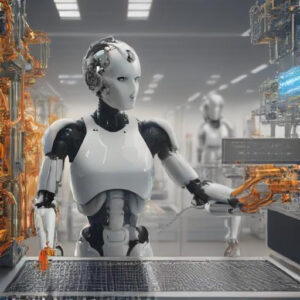AI is being quickly embraced by business in America to automate tasks that were previously performed only by humans.
A poll of finance chiefs conducted on Thursday revealed that over half (61%) of big US companies intend to use AI over the next year to automate jobs that were previously completed by employees.
According to the Duke University and the Federal Reserve Banks of Atlanta and Richmond survey, these responsibilities range from financial reporting to paying suppliers and completing bills.
This is on top of the creative duties that some companies currently outsource to ChatGPT and other AI chatbots for help with, such as creating job posts, press releases, and marketing campaigns.
According to the research, businesses are using AI more and more to save expenses, increase revenue, and improve employee productivity.
“You cannot be leading a creative organization without giving these technologies careful thought. You run the risk of being left behind.” In a phone interview, Duke finance professor and survey academic director John Graham said.
In the CFO Survey, conducted by the Atlanta and Richmond Fed banks in partnership with Duke, it was discovered that almost one-third (32%) of all businesses, big or small, intend to employ AI in the upcoming year to finish jobs that were previously completed by people.
Why bosses are deploying AI
This is already partially the case, particularly in larger companies with the resources to test AI.
In the last year, about 60% of all businesses (and 84% of major businesses) surveyed stated they had already used software, hardware, or artificial intelligence (AI) to automate jobs that employees had previously completed. Between May 13 and June 3, the survey was performed.
For a number of reasons, including cost savings, bosses are turning to artificial intelligence (AI). According to the CFO Survey, businesses are utilizing automation to boost output (49%), lower labor costs (47%), improve product quality (58% of firms), and replace workers (33%).
The good news for workers is that some experts don’t think AI will result in a mass loss of jobs—at least not immediately.
Graham stated, “I don’t think there will be a lot of job loss in the year.” In the near term, this will primarily include filling in some gaps and maybe delaying recruiting someone they otherwise would have hired, but not terminating anyone. That’s partly because everything here is brand-new.
Are AI copilots coming soon?
Nevertheless, if they haven’t already, workers will be impacted by the deployment of AI. Humans might have more time to prioritize what is most fulfilling and important, Graham added.
Billionaire investor and LinkedIn co-founder Reid Hoffman said that while AI will probably displace some jobs, it won’t do so anytime soon.
Hoffman spoke of the years, not the decades, but the years, not the months, that AI will eventually replace humans. He thinks that in three to five years, everyone of us will have a kind of agency co-pilot who will assist us with everything from writing and work to dinner preparation.
Hoffman noted that it will be a co-pilot for a while rather than a pilot. Hoffman co-wrote “Impromptu: Amplifying Our Humanity Through AI” last year with help from ChatGPT-4.
It is a change in jobs. AI will replace human labor, but the replacement will come from other humans, he said. The entire concept is around the human employing AI—learning it, applying it, and making it happen.
AI and inflation
For the time being, pressures from inflation and the cost of living continue to worry employers and bosses.
According to the CFO Survey, US chief financial officers’ top concern for the upcoming year is inflation, with interest rates and monetary policy coming in second. The majority of CFOs (57%) anticipate that their items’ prices will rise this year more quickly than usual.
Nonetheless, the inflation forecast based on the uptake of new technologies differed. According to the survey, businesses that have incorporated automation in the last 12 months anticipate a slower increase in prices than those that haven’t.
The professor from Duke, Graham, stated that while AI might someday help restrain price increases, he is not hopeful that technology would immediately play a significant role in lowering inflation.
He remarked, “It doesn’t feel like it will be the cure in the next year.”
Significant risks
The CFO survey demonstrates how quickly businesses are utilizing AI, despite the fact that legal and safety frameworks are still being developed. Some are concerned about the quick adoption of AI in certain sectors, notably finance.
In a speech earlier this month, Treasury Secretary Janet Yellen issued a warning, stating that financial organizations’ use of AI presents both “tremendous opportunities and significant risks.”
The chairman of the Homeland Security and Government Affairs Committee, Democratic Sen. Gary Peters, said in a report released last week that the use of AI by hedge funds is already insufficiently addressed by the repeal of the legislation.
The report issued a warning, stating that there are no rules or specifications dictating whether or not human intervention is required in decision-making, particularly that which pertains to trading.
As businesses in all industries experiment with AI, Graham, the Duke professor, advised them to have robust risk management procedures and redundancies in place.
According to him, AI is being adopted quite quickly. He hopes it’s being done with caution. There will be instances where businesses move a bit too quickly and end up with humiliating supply chain or product dilemmas.








